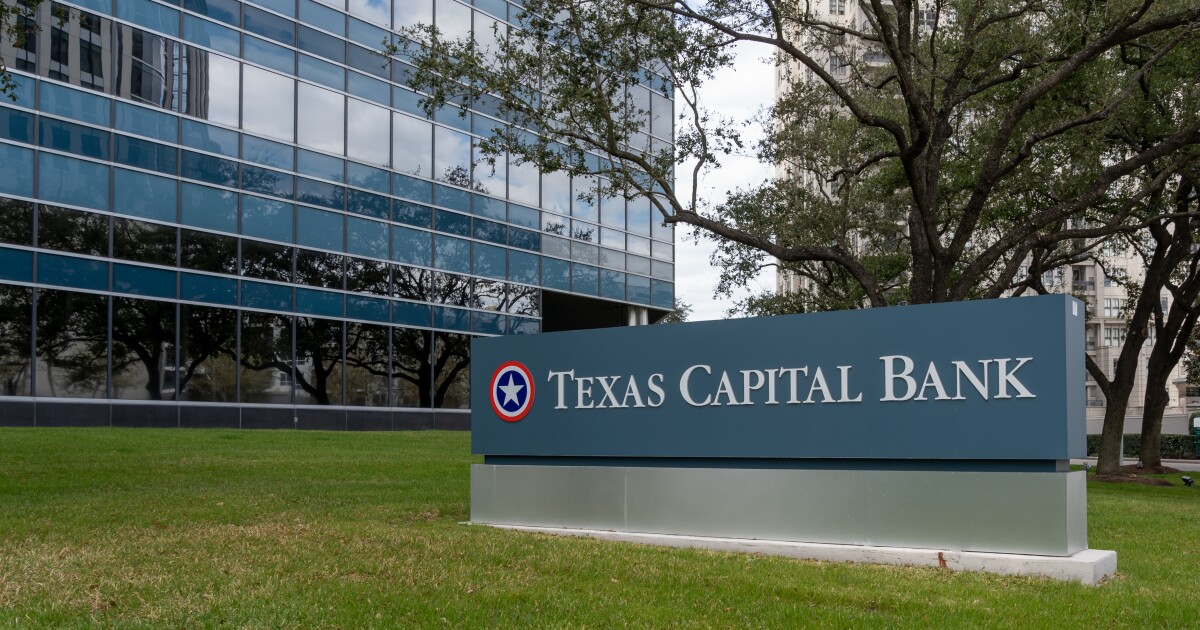
Texas Capital Bancshares is braced for "inconsistent" revenues in the near term as its mortgage finance business takes a hit, but
The Dallas-based bank had a rougher-than-expected end to last year, in part driven by a $751 million quarterly drop in mortgage finance loans. The sputtering in the business was tied to "predictable seasonality," as fourth quarters are often weaker for homebuying, but the bottom isn't in sight. Texas Capital expects next quarter to be "amongst the toughest the industry has seen in the last 15 years," Chief Financial Officer Matt Scurlock said on the company's fourth-quarter earnings call Thursday.
Net interest income at the bank fell nearly $18 million in the quarter to $214.7 million, which Jefferies analysts wrote "disappointed slightly," and which Scurlock attributed almost entirely to the mortgage finance slump. However, CEO Rob Holmes said despite the blip, the bank's mortgage strategy is aligned with
"The firm has been and remains committed to banking the mortgage finance industry as it weathers what is the most challenging operating environment in the last 15 years," Holmes said on the bank's earnings call. "Over the previous 18 to 24 months, we have refocused client selection and improved the service model as we look not to expand market share, but to instead deepen relationships to improve relevance with the right clients."
Cross-selling is working, he said. Of clients that started with just a warehouse line of credit, Holmes said that all of them now have some treasury relationship with the bank, and nearly half have an account open with a broker-dealer at the bank. The company's stock rose 2.43%, to $63.12 per share, on Thursday.
Texas Capital wasn't able to make up the revenue lost in its mortgage business either, with a fourth quarter of flat commercial loans, stagnant or lower fee income and a fall in investment banking and trading income.
Holmes
Under the leadership of new CEO Rob Holmes, the Dallas-based company has embarked upon a top-to-bottom transformation to become the "flagship financial services firm" of the Lone Star State. But can Holmes make progress quickly enough to satisfy impatient investors?
As part of the master blueprint, Holmes set ambitious goals with a 2025 deadline, including a return on assets of greater than 1.1% and return on tangible common equity of over 12.5%. Those goals, according to a note from Jefferies analysts, "will require dramatic improvement in the next year" since the bank reported a 0.47% ROA and 4.4% ROTCE in the fourth quarter.
Still, Holmes said the bank has the products, tech and talent in place to meet its objectives. While there's fine-tuning to do, Holmes said now that the more dramatic parts of Texas Capital's
"It's 100% execution now — that's what's so exciting about where we are in the transformation," Holmes said. "The risk of the build is done. We have a core competency now of taking efficiencies and improving client journeys. We have data-as-a-service. We feel really good about the tech platform and the run-the-bank versus change-the-bank composition of the spend."
Some of the pieces of the strategy, though in their early stages, are beginning to prove longer-term values. Texas Capital's investment banking and trading business, which was nearly nonexistent before 18 months ago, increased annual income by 146% to $86.2 million even though quarterly income fell more than 60%.
The bank deemed its investment bank an "area of focus," along with assets under management, treasury product fees and wealth management and trust fees, which altogether grew 64% from the previous year. In 2023, investment banking and trading generated 8% of the bank's total revenue, and the goal is to have the unit bring in 10% of total revenue in 2025.
"When we launched the strategy, we acknowledged that results generated by the newly formed investment bank would not be linear, and that it would take several years to mature the business with a solid base of consistent and repeatable revenues," Holmes said. "Despite broad-based early success, we expect revenue trends to be inconsistent in the near-term — the same as all firms — as we work to translate early momentum into a sustainable contributor to future earnings."



